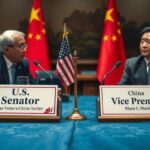Politics
ASIA, BEIJING, BIDEN ADMINISTRATION, BULGARIA, CHINA, COMMUNIST PARTY, DAINES, EUROPE, FOREIGN POLICY, FU, GEOPOLITICS, GREENLAND, HE LIFENG, INSTITUTE OF INTERNATIONAL STUDIES, MEXICO, MONTANA, NATIONAL SECURITY, NORTH AMERICA, SHANGHAI, STEVE DAINES, TRUMP, UKRAINE, UNITED STATES, UNIVERSITY, US-CHINA RELATIONS, VOL, VOLODYMYR ZELENSKY, WASHINGTON, WU, WU XINBO, XI JINPING
Dante Raeburn
China’s Cautious Approach to Proposed Trump-Xi Summit
China is cautious about a potential summit between President Trump and Xi Jinping due to ongoing trade tensions and unpredictable U.S. policies. Although Senator Daines visited Beijing to lay groundwork for a meeting, significant delays are anticipated in formalizing arrangements. Both nations seek clarity on trade agreements before scheduling a summit, with uncertainty surrounding the timeline for meaningful dialogue.
In light of recent tensions between the United States and China, arranging a meeting between President Trump and Chinese leader Xi Jinping poses significant challenges. Despite Trump expressing willingness to meet, Chinese officials insist that a carefully scripted encounter is essential before any substantial reset in relations can occur. The slow progress in scheduling a summit has become evident, as indicated by Senator Steve Daines’ recent visit to Beijing, where he aimed to facilitate this presidential meeting despite recognizing a lag in timing.
During Daines’ visit, he met with Vice Premier He Lifeng to discuss the summit, articulating hopes for an agreement by the end of the year. However, this timeline appears slower than anticipated by many in Washington, as recent actions by Trump, including aggressive trade policies, have alarmed Chinese officials. They have exhibited hesitance towards a summit due to the unpredictable nature of Trump’s foreign policy and public diplomacy.
Chinese experts suggest that no meeting will take place until both parties formalize agreements in advance, which remain unspecified from the Trump administration. Wu Xinbo, a leading academic from Fudan University, noted that China is awaiting clearer directions on how to negotiate with the Trump administration.
There remains speculation about a potential meeting in New York during the upcoming UN General Assembly in September, but experts caution that the required progress may not be achievable before then. Meanwhile, the Chinese Ministry of Foreign Affairs has not released any updates concerning the summit’s timing.
Recent developments, such as the imposition of new tariffs on Chinese imports by the United States, persist as a concern and have prompted retaliation from China, including increased tariffs on American agricultural exports. The backdrop of heightened trade frictions complicates any negotiations for a meeting. Daines’ congressional visit marks a rare instance of high-level dialogue, yet the lack of immediate results, such as China halting beef imports from the U.S., raises questions about the effectiveness of such diplomatic efforts.
Daines highlighted the significant impact of China’s recent decision on U.S. ranchers and pressed for a reversal, reflecting the urgency of addressing trade barriers amid ongoing negotiations. Despite the complexities, the commitment to dialogue remains evident, though contingent upon a resolution of pressing trade disagreements.
In conclusion, the potential summit between President Trump and Xi Jinping is fraught with complications. Slow negotiations, recent aggressive trade policies, and the cautious approach of Chinese officials highlight the challenges in achieving meaningful dialogue. Both nations are poised to address critical issues affecting bilateral relations; however, significant hurdles must be overcome before any formal meeting can take place. The outcome remains uncertain, underscoring the delicate nature of U.S.-China relations at this juncture.
Original Source: www.nytimes.com








Post Comment